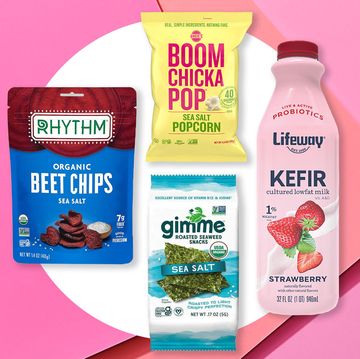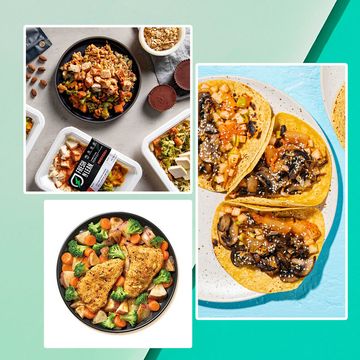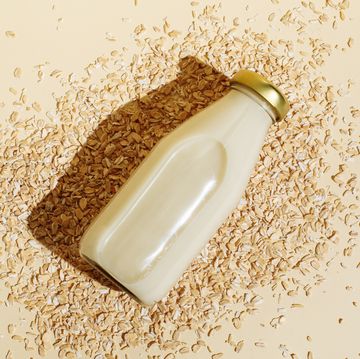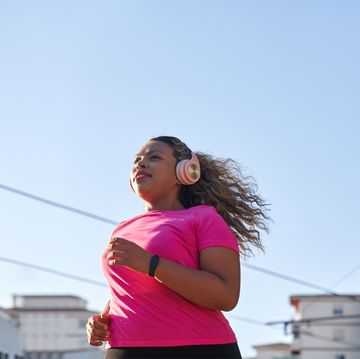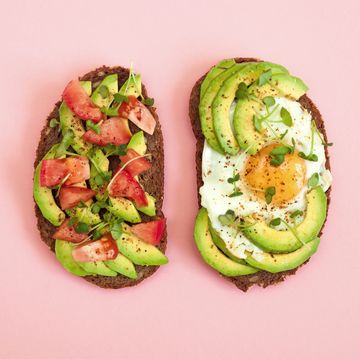If you've tried every diet trick in every diet book and fat still clings to you like white on rice, it's easy to think you're just not meant for skinny jeans. But like a lot of "slimming" food, weight-loss advice isn't always fit for consumption. A recent study found there's little data to back up some popular pound-shedding tactics. Which explains why many women heeding such techniques end up throwing in the towel instead of reaching their goals, says study coauthor Krista Casazza, Ph.D., R.D.
Hey, don't feel bad. We've fallen for some of these ourselves in the past. And while we're always advocates of whatever—healthy!—trim-down methods work for you, keep an eye out for strategies that might be secretly thwarting your attempts to shift the scale.
The Lie: You Should Take It (Off) Slow
Reality: Yes, rapid weight loss can lead to the dreaded yo-yo effect. But your diet doesn't need to crawl along at the oft-touted half-pound-per-week rate—or even stick to a steady pace, says Elisabetta Politi, M.P.H., R.D., of the Duke Diet and Fitness Center. As long as you're going about it in a safe way, it's fine to drop five pounds in one week and lose only one pound in another. Bonus news for speed demons: Research shows that working with a tighter deadline can actually increase motivation. When overweight dieters were tasked with losing 15 percent of their body weight in either 12 or 36 weeks, 80 percent of people with the shorter time frame were successful, versus just 50 percent of those on the slower schedule.
The Lie: Drinking Water Prevents Overeating
Reality: The more H2O in your stomach, the less room for grub...right? Not exactly, says Barbara Rolls, Ph.D., a nutritional science professor at Penn State University. Water doesn't trigger your satiety sensors the same way food does, and even if it did, you pee the stuff out pretty quickly. Without the bulk of digestion-slowing fiber, you'll likely swallow just as many calories. Instead of straight glugging pre-meal, aim to eat more foods that are rich in fiber and water, a combo that will help keep you full. Rolls suggests a 150- to 200-calorie snack like an apple or cup of broth-based soup before your main course. "Our research proves this will help you consume 20 percent fewer total calories," she says.
RELATED: Q&A: Can Water Really Help You Lose Weight?
The Lie: The Fewer Calories, the Better
Reality: It's true that you need to drop cals to drop pounds. But one of the main reasons people hit weight-loss plateaus is because eating too little can slow down the calorie-torching furnace known as your metabolism. And hunger pangs may interfere with the process that transforms white fat (the unhealthy kind that ups your risk for heart disease) into brown fat (the good-for-you type that—yesss—helps burn calories), per research from Yale School of Medicine. Make sure you're getting at least 1,200 calories every day, and never skip meals—doing so can also affect blood-glucose levels and send your appetite on a raging roller coaster that's ultimately more likely to cause you to overeat.
For three more common dieting "rules" that might be sabotaging your weight-loss, pick up the March 2015 issue of Women's Health, on sale now.
More from Women's Health:
The Number 1 Reason You're Not Achieving Your Weight-Loss Goal
6 Motivational Weight-Loss Quotes That Are All Lies
6 Healthy Foods You’re Probably Overeating





